Devanie Tovar landed a job at a plasma center right after graduating from Edison High School in 2022. Now, she’s an X-ray technician for the U.S. Navy and hopes to be a surgeon one day.
Tovar credits her phlebotomy certification, earned through San Antonio Independent School District’s medical track program, for her career path. Without it, Tovar said she wouldn’t have been able to get a job making $17 an hour right after graduating high school.
Currently, the average hourly wage for a health care support position in San Antonio is $15.93, according to the U.S. Bureau of Labor Statistics.
More than wanting to learn a profitable skill, SAISD’s phlebotomy program caught Tovar’s attention because of its “hands-on” nature.
“It was just something I’ve always wanted … helping other people,” Tovar, 22, said.
SAISD has offered phlebotomy certifications for six years now, and so far this year, 50 students have completed certifications. This program helps students learn skills for drawing blood for medical testing, research or donation.
 Devante Tovar received a phlebotomy certification while attending Edison High School in 2022. Now she’s an X-ray technician for the U.S. Navy. Credit: Courtesy / SAISD
Devante Tovar received a phlebotomy certification while attending Edison High School in 2022. Now she’s an X-ray technician for the U.S. Navy. Credit: Courtesy / SAISD
Piloted at Edison High School and SAISD’s Adult and Community Education Center, the certificate is accessible to nearly all of the district’s high schools.
A phlebotomy certificate can take between six months and a year and half to finish, including mandatory health science classes and the completion of 35 blood draws in one semester.
Many high school students who go through the phlebotomy program often complete a certified medical assistant (CMA) program too. During the 2024-25 school year, 123 students across the school district enrolled in CMA programs.
Johnny Vahalik, assistant superintendent of college, career and military readiness at SAISD, worked on expanding health career and technical education programs.
“Our model was, ‘What do you need to get a job in a doctor’s office right out of high school?’” Vahalik said.
Health care jobs are also in high demand in the San Antonio area. The local life sciences and health industry was projected to grow 10% between 2023 and 2028, and there were nearly 5,000 health care job openings in Bexar County in 2023.
Having both phlebotomy and CMA certifications makes a student “powerful,” Vahalik said.
Undocumented students excluded
Despite recent growth and expansion of career and technical education programs in San Antonio, industry-based certifications are not accessible to all students.
To have legitimate licenses, students often have to apply and register with the state of Texas, meaning they must be fingerprinted, have some form of valid identification and have a Social Security number.
Students without legal status can’t apply for state licensures to work in law enforcement, phlebotomy, as medical or certified nursing aides or as a pharmacy technician.
Often, Vahalik doesn’t know a student is undocumented until they’ve passed all their classes and it’s time to register with the state. The district has been lobbying with industry partners to try and change state legislation restricting certifications to documented residents and citizens, Vahalik told the Report.
“But this year has been the opposite — we’re not seeing that support from the state at all,” he said.
More than job placement
For students, having these certifications can be more than a ticket into the health workforce. Vahalik calls them “stepping stones” to high-paying and fulfilling careers.
Lilly Mora, a rising senior at Phoenix Middle College, got her phlebotomy certification during her junior year and will graduate high school as a certified nursing assistant (CNA). The 17-year-old is part of the first cohort of phlebotomy technicians and CNAs at her high school.
Phoenix Middle College and St. Philip’s Early College High School — both located on the St. Philip’s College campus — offer programs where students take college courses specializing in phlebotomy education and techniques.
Mora ultimately wants to join the U.S. Air Force and train to be a registered nurse. She would be the first in her family to go to college.
She said she felt motivated to pursue a health track after going through the loss of her godfather and grandmother about two years ago.
“My mom is very proud,” Mora said. “My mom’s a teen mom, so at my age, she was already experiencing different life experiences, and she just wants me to shoot for more and better in life.”
Both Mora and Tovar encourage students to pursue phlebotomy certifications: it’s more than learning how to stick people with needles.
“I encourage people to start as soon as they can and as soon as they get their hands on any type of experience like this,” Mora said.
